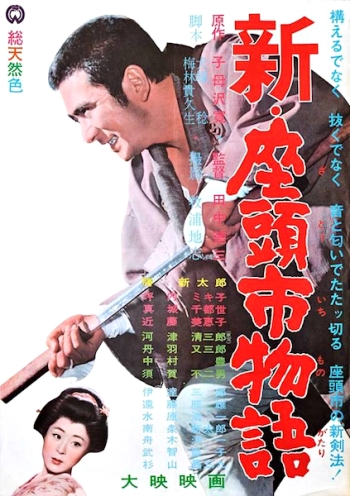Tokuzô Tanaka | 92 mins | Blu-ray | 2.35:1 | Japan / Japanese

With studio Daiei apparently realising they had a potential long-running series on their hands, blind masseur cum roving wrong-righter Ichi (Shintarô Katsu) makes his colour debut in this third film. Despite the obvious visual change, New Tale picks up on plot threads from the previous film, concluding a trilogy of sorts that spans the series’ first three instalments.
Two strands from Ichi’s past come forth to challenge him this time: as he’s hunted by the brother of a villain he killed in the previous film, Ichi runs into the master who trained him to be a sword fighter, Banno (Seizaburô Kawazu). Desperate for money, Banno has fallen in with a criminal gang, while also trying to marry his younger sister, Yayoi (Mikiko Tsubouchi), to a respectable samurai — but Yayoi has feelings for Ichi.
Where the first Zatoichi sequel was faster and more action orientated, New Tale takes a slower, character-driven tone. Ichi is pulled in multiple emotional directions, most of which he keeps stoically buried, but we can still interpret them from Katsu’s nuanced performance. The most forefront theme is violence and the honour of it: Ichi vows to renounce those ways to marry Yayoi, while Banno is betraying them with his greedy actions — and naturally those two are going to come into conflict. It makes for a sombre film, that doesn’t come to a happy conclusion.

Although this is the first colour Zatoichi, director Tokuzô Tanaka keeps the palette muted throughout, but this is particularly obvious at the end: after Ichi gives in to his old ways, the final shot is practically in black and white, like the previous two films — perhaps a visual indicator of our hero’s return to, or acceptance of, his previous position. Although this dull colour scheme means New Tale isn’t the most vibrantly exciting film visually, it’s compositionally strong, making appropriate use of the wide frame. It’s interesting to note that Tanaka was previously an assistant director on such acclaimed masterpieces as Rashomon, Ugetsu Monogatari, and Sanshô Dayû, so I guess he picked up a thing or two.
As Ichi hits the road again at the end (I don’t think it counts as a spoiler that he doesn’t ultimately settle down), it feels a little like an origin story has been completed, setting Ichi off on a path ready for standalone adventures. That said, according to the liner notes that accompany Criterion’s Blu-ray release, audiences “became increasingly starved” for details of Ichi’s past as the series went on, so I guess some people weren’t satiated.
I don’t think New Tale is quite the equal of the first film, which seems the purest execution of the character as yet, but its thoughtfulness in engaging with the emotional effects of a violent life mark it out as a step above the second movie.

